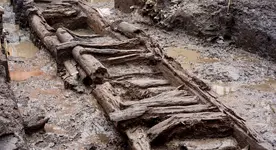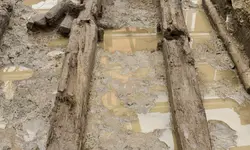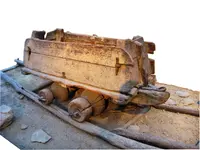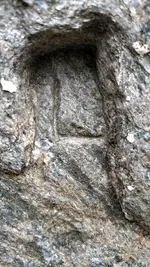Would you or I cross an ocean to hide our most valued possessions? Even if we had a ship and crew and organisation at our disposal? Then just leave it?...
Or would we squirrel such possessions (no longer in our possessions once secreted somewhere remote from us.) where they can be checked time to time ,or recovered at will?
I'm presently reading "Numismatic Finds of the Americas: An Inventory of American Coin Hordes, Shipwrecks, Single Finds, and Finds in Excavations," by John M. Kleeberg. I'm not done with it yet and I haven't been keeping tabs, but if you were to ask me what percentage of accidental hordes were found (pre-metal detecting days) either while excavating basements or digging in fields, I would say that it is well over half. Which makes sense, I suppose, as that's exactly where I'd hide something important - under the floor of my basement, or else out in a farm field where I could see it, and it would be interred while digging was already going on so as not to raise any suspicion through digging. And there would be a crew of one burying it: me, because if it's something truly important, I'm the only person that I'd trust with that knowledge. And if I suddenly died, the location of that treasure would die with me.
Maybe those old-timers weren't so dumb after all. Yeah, in each of these cases someone eventually found the treasure, but not while the owner was alive. Sometimes not until centuries after the owner had died. And in pretty much all of those cases, putting the treasure a few feet deeper would have meant that it would never have been found. 90 feet is not necessary. 10 feet is more than adequate and, as you mentioned, carries a lot less risk of someone spotting you in the act of burying it.
Aside from fields and basements, probably the other single biggest source of hordes are shipwrecks. There is a lesson there as well. Until fairly modern times, if you had something that you couldn't afford to lose, you didn't put it on a ship unless you absolutely had to.
The more that I think about it, the less sense that burying something important across the ocean makes. I would have buried it in a basement. When it was time to recover it, anyone could do the job; all I'd have to do is say, "Hey, you know that yellow house at the end of 1st Street? The one on the left? SW corner of the basement, 1 foot away from each wall. Dig ten feet down right there." There would be exactly zero chance of someone observing me burying it, and zero chance of someone observing someone recovering it. It would be physically guarded most of the time, even if the person guarding it did not know that they were guarding it. (Most people react negatively to strangers digging holes uninvited in their basements, regardless of the reason.) If that house were to burn down or be demolished and was replaced by another house, or a condominium, or a parking lot...no matter. Just as long as the memory of where that house used to be lived on in some way, someone could conceivably retrieve the treasure when it was time to do so, but nobody would ever accidentally find it.
And I'm not the first one to have thought of this, either. Hell, I didn't even think of it on my own. Others here have mentioned this to me, and then there are all the hordes that have been recovered from basements over the last few centuries in this country alone, and only because they were buried shallow; just a few feet deeper and they'd still be there. It makes one wonder just how much wealth is in the ground right on one's own block, doesn't it?










